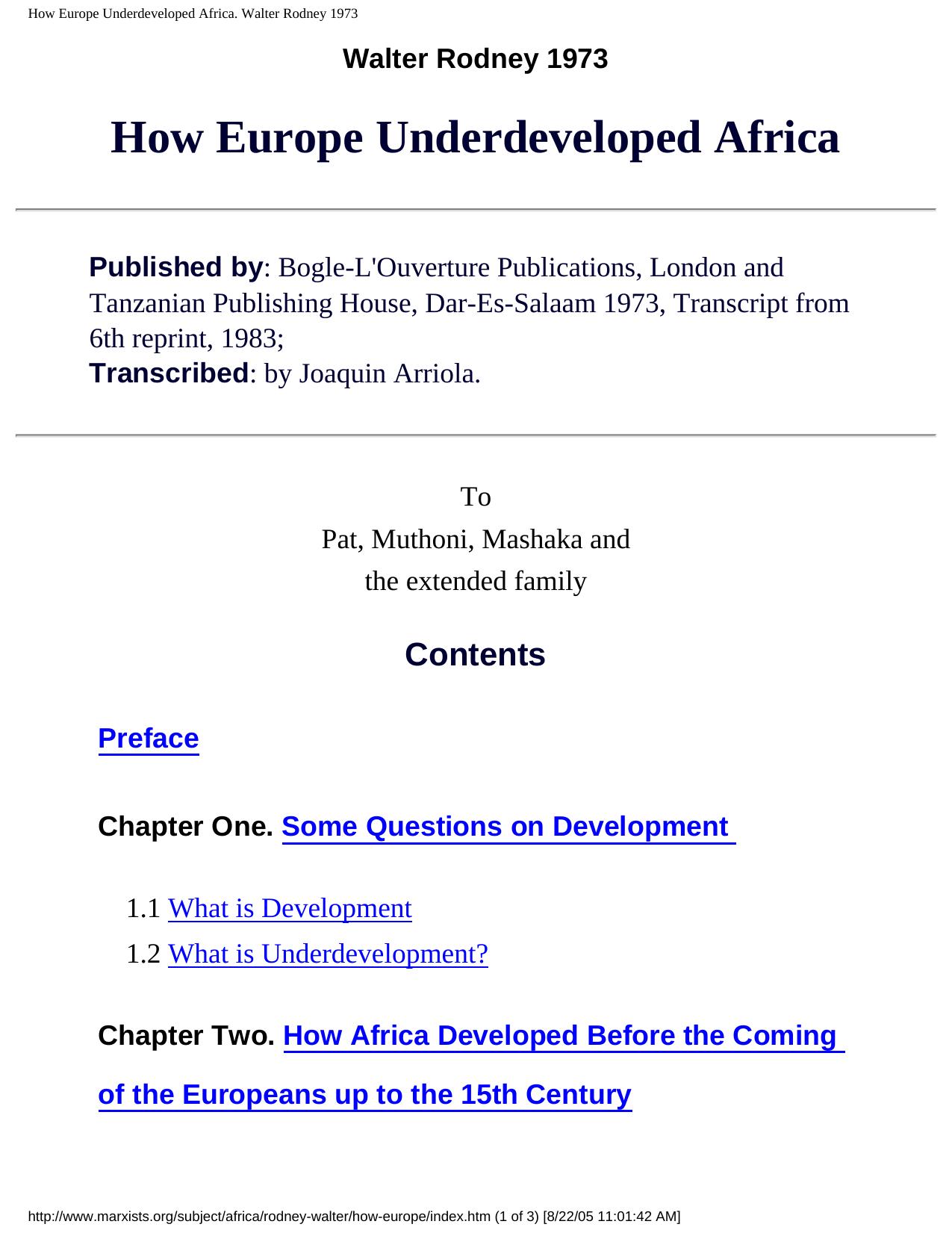How Europe Underdeveloped Africa by Walter Rodney

Author:Walter Rodney [Rodney, Walter]
Language: eng
Format: epub, pdf
ISBN: 9781574780529
Publisher: Black Classic Press
European Trading Companies versus the African Peasant
So far, this section has been dealing with that part of the surplus produced by African wage earners in mines and plantations. But the African working class under colonialism was extremely small and the vast majority of Africans engaged in the colonial money economy were independent peasants. How then can it be said that these self-employed peasants were contributing to the expatriation of African surplus? Apologists for colonialism argue that it was a positive benefit for such farmers to have been given the opportunity to create surplus by growing or collecting produce such as cocoa, coffee, palm oil. It is essential that this misrepresentation be clarified.
A peasant growing a cash crop or collecting produce had his labor exploited by a long chain of individuals, starting with local businessmen. Sometimes, those local businessmen were Europeans. Very rarely were they Africans, and more usually they were a minority group brought in from outside and serving as intermediaries between the white colonialists and the exploited African peasant. In West Africa, the Lebanese and Syrians played this role; while in East Africa the Indians rose to this position. Arabs were also in the middleman category in Zanzibar and a few other places on the East African coast.
Cash-crop peasants never had any capital of their own. They existed from one crop to another, depending on good harvests and good prices. Any bad harvest or fall of prices caused the peasants to borrow in order to find money to pay taxes and buy certain necessities. As security, they mortgaged their future crops to moneylenders in the middleman category. Non-payment of debts could and did lead to their farms’ being taken away by the moneylenders. The rate of interest on the loans was always fantastically high, amounting to what is known as “usury.” In East Africa, things were so bad that even the British colonial government had to step in and enact a “Native Credit Ordinance” to protect Africans from Asian businessmen.
However, in spite of some minor clashes between the colonialists and the middlemen, the two were part and parcel of the same apparatus of exploitation. On the whole, the Lebanese and Indians did the smaller jobs which Europeans could not be bothered with. They owned things such as cotton gins which separated the seed from the lint; while of course Europeans concentrated on the cotton mills in Europe. The middlemen also went out to the villages, while Europeans liked to stay in towns. In the villages, the Indians and Lebanese took over virtually all buying and selling, channeling most of the profits back to Europeans in the towns and those overseas.
The share of profits which went to middlemen was insignificant in comparison to those profits reaped by big European business interests and by the European governments themselves. The capitalist institution which came into most direct contact with African peasants was the colonial trading company: that is to say, a company specializing in moving goods to and from the colonies. The
Download
How Europe Underdeveloped Africa by Walter Rodney.pdf
This site does not store any files on its server. We only index and link to content provided by other sites. Please contact the content providers to delete copyright contents if any and email us, we'll remove relevant links or contents immediately.
International Integration of the Brazilian Economy by Elias C. Grivoyannis(111061)
The Radium Girls by Kate Moore(12029)
Turbulence by E. J. Noyes(8052)
Nudge - Improving Decisions about Health, Wealth, and Happiness by Thaler Sunstein(7709)
The Black Swan by Nassim Nicholas Taleb(7130)
Rich Dad Poor Dad by Robert T. Kiyosaki(6637)
Pioneering Portfolio Management by David F. Swensen(6301)
Man-made Catastrophes and Risk Information Concealment by Dmitry Chernov & Didier Sornette(6019)
Zero to One by Peter Thiel(5802)
Secrecy World by Jake Bernstein(4753)
Millionaire: The Philanderer, Gambler, and Duelist Who Invented Modern Finance by Janet Gleeson(4479)
The Age of Surveillance Capitalism by Shoshana Zuboff(4293)
Skin in the Game by Nassim Nicholas Taleb(4250)
The Money Culture by Michael Lewis(4207)
Bullshit Jobs by David Graeber(4192)
Skin in the Game: Hidden Asymmetries in Daily Life by Nassim Nicholas Taleb(4007)
The Dhandho Investor by Mohnish Pabrai(3766)
The Wisdom of Finance by Mihir Desai(3748)
Blockchain Basics by Daniel Drescher(3583)
